
London Review of International Law
Scope & Guideline
Exploring the Dynamics of Global Governance through Law
Introduction
Aims and Scopes
- Critical Examination of International Law:
The journal emphasizes a critical approach to understanding international law, questioning its foundations, principles, and implications, particularly in relation to power dynamics and historical contexts. - Interdisciplinary Methodologies:
It incorporates interdisciplinary methodologies that draw from fields such as sociology, political science, history, and cultural studies, facilitating a broader understanding of legal phenomena. - Focus on Human Rights and Social Justice:
A consistent focus on human rights, social justice, and the impacts of law on marginalized communities is evident, highlighting the ethical dimensions of legal practices. - Exploration of Contemporary Issues:
The journal actively engages with contemporary global issues, such as migration, digital humanitarianism, and the implications of neoliberalism on international law, providing timely analyses of pressing topics. - Intersection of Law and Culture:
Exploring the interplay between law and cultural practices, the journal examines how cultural narratives influence legal frameworks and vice versa, contributing to a richer understanding of law's role in society.
Trending and Emerging
- Digital Humanitarianism and Technology:
There is a growing focus on digital humanitarianism, exploring how technology interfaces with international law and humanitarian efforts, which reflects the increasing importance of digital contexts in legal analysis. - Critical Perspectives on Neoliberalism:
Research critiquing the impacts of neoliberalism on international law and institutions has gained traction, indicating a broader interest in the socio-economic dimensions of legal frameworks. - Intersectionality and Social Justice:
Emerging themes of intersectionality in relation to race, gender, and class are becoming more prominent, highlighting the need for inclusive approaches to international law that address systemic inequalities. - Responses to Global Crises:
The journal is increasingly addressing responses to global crises, such as climate change and migration, showcasing the urgency of international law in tackling contemporary challenges and its adaptability in crisis contexts. - Cultural and Artistic Representations of Law:
There is a notable trend towards examining the cultural and artistic representations of law, reflecting a growing recognition of how narratives and representations shape legal understanding and practice.
Declining or Waning
- Historical Analysis of Traditional Legal Doctrines:
There seems to be a waning focus on traditional legal doctrines and historical analyses that do not engage critically with contemporary issues, reflecting a move towards more applied and intersectional research. - Conventional State-Centric Perspectives:
Themes that revolve around conventional state-centric views of international law are appearing less frequently, possibly due to the journal's shift towards more nuanced and critical perspectives that consider non-state actors and transnational issues. - Legal Formalism and Technical Legal Analysis:
There is a noticeable decline in papers that focus solely on technical legal analysis or formalistic interpretations of international law, as the journal increasingly champions critical, reflexive approaches. - Overly Theoretical Discussions:
Discussions that are overly theoretical without practical implications or connections to real-world issues seem to be decreasing, indicating a preference for research that bridges theory and practice.
Similar Journals
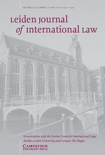
Leiden Journal of International Law
Exploring the intersections of law and politics.Leiden Journal of International Law, published by Cambridge University Press, stands as a leading platform for scholarly discourse in the fields of international law and political science. With its ISSN 0922-1565 and E-ISSN 1478-9698, the journal has established a significant academic presence since its inception in 1988, upholding rigorous standards through a robust peer-review process. The journal is notable for its impressive impact factor, categorizing it in the Q1 quartile for law and Q2 for political science and international relations, indicating its widespread influence and recognition among scholars. As a vital resource for researchers and practitioners, the journal contributes to the advancement of legal scholarship and promotes critical discussions surrounding contemporary international issues. Although it operates under a traditional subscription model, its comprehensive analyses and critical insights make it an essential read for those engaged in the interdisciplinary examination of law and global governance. The journal is headquartered in Cambridge, England, and continues to play a pivotal role in shaping the discussions that define the contemporary landscape of international law.

QUEENS LAW JOURNAL
Fostering Critical Analysis in Legal StudiesQUEENS LAW JOURNAL is a prestigious legal journal published by Queen's University, Faculty of Law, located in Kingston, Ontario, Canada. With its ISSN 0316-778X, the journal serves as a key platform for academic discourse and research in the field of law, encompassing various disciplines such as criminal law, constitutional law, and international law. Although currently not available as Open Access, the QUEENS LAW JOURNAL maintains a strong reputation for publishing impactful research, making it a vital resource for legal scholars, practitioners, and students alike. By fostering an environment for innovative legal theories and critical analyses, the journal plays an essential role in advancing legal scholarship and promoting informed discussions on pertinent legal issues. Emphasizing quality and rigor, the QUEENS LAW JOURNAL is a valuable addition to any academic library and serves as a trusted reference for those engaged in the legal profession.
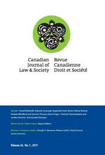
Canadian Journal of Law and Society
Fostering Critical Research at the Intersection of Law and SocietyThe Canadian Journal of Law and Society, published by Cambridge University Press, is a distinguished academic journal dedicated to the multidisciplinary exploration of legal systems, social dynamics, and the intricate relationships that shape law and society. With an ISSN of 0829-3201 and an E-ISSN of 1911-0227, this journal has made significant contributions to the fields of Law, Sociology, and Political Science since its inception in 1986. Recognized in the 2023 category quartiles as Q3 in both Law and Sociology and Political Science, it stands as a credible platform for critical research, theoretical discussions, and empirical studies. Although not an open-access journal, it provides valuable insights that foster academic discourse and enhance understanding within the legal and social sciences domains. Addressed from the Edinburgh Building, Shaftesbury Road, Cambridge, England, the journal serves as an essential resource for researchers, practitioners, and students seeking to navigate the complexities of law and its societal impacts.
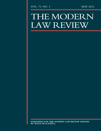
MODERN LAW REVIEW
Exploring the Frontiers of Legal Thought.MODERN LAW REVIEW, a prestigious academic journal published by Wiley, stands as a significant platform in the field of law, dedicated to exploring contemporary legal issues and fostering scholarly discourse since its inception in 1937. With an impressive Scopus Rank of #237 out of 1025 in the Social Sciences - Law category, placing it in the 76th percentile, the journal has consistently maintained a reputation for high-quality research, currently positioned in Q2 of the category quartiles as of 2023. The journal's comprehensive coverage spans various legal topics, making it essential reading for legal scholars, practitioners, and students alike. Although it is not an open-access journal, its contributions are invaluable for guiding the future of legal scholarship. With a robust history of converged years from 1995, 1997 to 1999, 2001 to 2002, 2004, and 2011 to 2024, MODERN LAW REVIEW remains at the forefront of legal research, addressing pressing issues and influencing legal thought across disciplines.
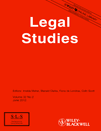
Legal Studies
Navigating Contemporary Legal Issues with ExpertiseLegal Studies, published by Cambridge University Press, is a leading journal in the field of law, recognized for its commitment to advancing scholarly dialogue and critical analysis of legal issues. With an ISSN of 0261-3875 and an E-ISSN of 1748-121X, this prestigious journal has been a key resource for researchers, practitioners, and students since its inception in 1981, and it continues to serve the academic community through rigorous peer-reviewed research up to 2024. Positioned in the Q2 category of law journals and ranked within the 60th percentile among social sciences law publications in Scopus, Legal Studies offers a unique platform for innovative legal scholarship, exploring contemporary legal phenomena and their societal implications. Although not an open-access journal, it provides subscribers and institutional partners with exclusive access to high-quality articles that inform legal thought and practice. The journal’s aim is to foster interdisciplinary perspectives and to challenge traditional viewpoints, making it an indispensable tool for anyone engaged in the legal field.

Ragion Pratica
Illuminating Contemporary Issues Through Rigorous ResearchRagion Pratica is a distinguished academic journal that serves as a vital platform for scholarly discourse in the fields of Law, Philosophy, and Sociology and Political Science. Published by SOC ED IL MULINO in Italy, this journal aims to foster intellectual rigor and innovation by featuring research contributions that explore contemporary issues and theoretical advancements within these disciplines. With an emphasis on both empirical and theoretical research, Ragion Pratica is positioned as a Q3 journal in Law and Sociology, and Q2 in Philosophy for 2023, making it an essential resource for researchers, professionals, and students seeking to enhance their understanding of complex social dynamics. Although it operates under a traditional access model, the journal consistently attracts a diverse array of submissions that reflect the ongoing evolution of thought in these areas, ensuring its significance within the academic community. The journal's ISSN is 1720-2396, and it has been converging notable scholarship since its inception in 2016, contributing to the rich intellectual legacy of its home country.

AJIL Unbound
Connecting Scholars to Contemporary Legal ChallengesAJIL Unbound is an esteemed open-access journal published by Cambidge University Press that has been serving the legal academic community since 2013. With its focus on international law and related social science disciplines, this journal offers a platform for innovative research and critical discourse in the field. Thanks to its robust engagement features and commitment to accessibility, AJIL Unbound facilitates the dissemination of knowledge while fostering scholarly communication among researchers, practitioners, and students. With a notable ranking of #192 out of 1025 in the realm of Social Sciences Law, it stands in the 81st percentile, showcasing its influence and reach within the legal field. Its open-access model enhances visibility and encourages wider participation in discussions surrounding pressing legal issues. As the journal continues to converge its objectives from 2013 to 2024, it remains a vital resource for academics looking to explore contemporary legal challenges and advancements.

Revista General de Derecho Europeo
Illuminating the Complexities of European JurisprudenceRevista General de Derecho Europeo is a prestigious academic journal dedicated to the study of European law, published by IUSTEL, a notable publisher recognized for its commitment to legal scholarship. This journal serves as a vital platform for the dissemination of cutting-edge research, fostering dialogue among scholars, practitioners, and policymakers in the field of European legal studies. With an ISSN of 1696-9634, it provides no-cost access to a diverse range of articles, ensuring that the latest developments in European jurisprudence are readily available to a broad audience. Although specific impact metrics such as the H-index are not detailed, the journal’s emphasis on quality and relevance positions it as an essential resource for anyone engaged in exploring the complexities of European law, its implications, and its evolution within a global context. Revista General de Derecho Europeo not only contributes to academic discourse but also equips its readers with critical insights necessary for navigating contemporary legal challenges in Europe.

Revista Juridica de Castilla y Leon
Empowering Dialogue in Law and GovernanceRevista Juridica de Castilla y Leon is a prestigious academic journal dedicated to advancing legal scholarship in the field of law and governance. Published by the JUNTA CASTILLA & LEON, CONSEJERIA PRESIDENCIA & ADM TERRITORIAL, this journal plays a vital role in disseminating high-quality research and foster dialogue among legal practitioners, researchers, and students alike. Since transitioning to Open Access in 2003, it has removed barriers to knowledge, allowing a global audience uncontrolled access to innovative legal studies and practices. With its ISSN 1696-6759 and E-ISSN 2254-3805, the journal is committed to publishing articles that address contemporary issues and challenges in the legal landscape, particularly those relevant to the Spanish context. As a reliable source for its readers, Revista Juridica de Castilla y Leon contributes significantly to the field of law, encouraging interdisciplinary research and collaboration to influence policy and improve legal frameworks in Spain and beyond.
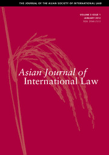
Asian Journal of International Law
Shaping the Future of International Legal ScholarshipThe Asian Journal of International Law, published by Cambridge University Press, is a premier academic journal dedicated to advancing the discourse on international law across Asia and beyond. With its ISSN 2044-2513 and E-ISSN 2044-2521, the journal has carved a significant niche in the field, achieving a Scopus rank of #463 out of 1025 in the Social Sciences category, placing it in the 54th percentile. As of 2023, it holds a Q3 category in law, reflecting its growing influence and recognition within the academic community. The journal features peer-reviewed articles that critically engage with contemporary legal issues, promote scholarly debate, and provide insights into the legal frameworks affecting the Asia-Pacific region. With no open access options currently available, it caters primarily to academics, professionals, and students seeking in-depth knowledge and critical analysis. The Asian Journal of International Law aims to be at the forefront of international legal scholarship, fostering an understanding of the complex legal landscapes that shape our world.